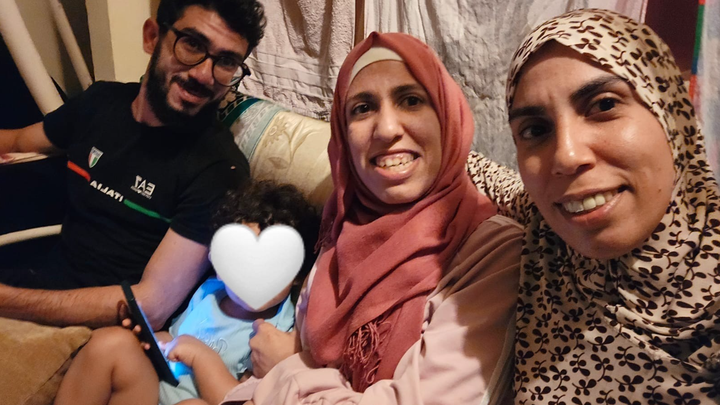Spende geschützt
A Palestinian Refugee's Family Fight Against PKAN
Hello, my name is Huda Farhat. I am a 33 year old Palestinian refugee, born and raised in a Palestinian camp south of Lebanon. Today I am reaching out with a heart breaking and desperate hope for my beloved younger sister and brother.
My sister Sawsan, who is 27 years old, and brother Shafiq, 28 years old have been recently diagnosed with a heartbreaking and incredibly rare genetic condition known as PKAN (Pantothenate Kinase-Associated Neurodegeneration). PKAN is a neurodegenerative disease that slowly robs my siblings of their motor functions, speech, and eventually their ability to walk, eat, swallow and live independently besides being robbed of their rights as refugees... and there is no cure.
In 2020, we noticed something was wrong. My vibrant siblings began to lose their balance, their speech began to slur, and painful muscle contractions took hold, in addition to no reason fainting. Within the limited resources of our refugee camp and UNRWA clinics, getting a diagnosis was a long frustrating battle. The lack of information and specialists in Lebanon left us with no answers.
Then, the war worsened everything. After tragically losing 8 extended family members and surviving the unspeakable horrors of conflict, and returning home gladly with minor glass damage, my siblings' health deteriorated rapidly. It was through the kindness of my best friend who connected us with doctors in Egypt that we finally received the devastating, but definitive, diagnosis: PKAN.
Today, PKAN is stealing passion from my siblings...
• Sawsan is experiencing significant difficulty with eating. She struggles to grasp food due to hands’ muscle contractions and deformities of the fingers, and she also has trouble chewing because of jaw joint dislocation. The most severe challenge is dysphagia (difficulty swallowing), as she frequently chokes while eating, which greatly affects her ability to eat safely.
• Shafiq is suffering from severe muscle atrophy and muscle contractions, along with progressive visual impairment and also experiencing involuntary movements, which further increase his risk of injury during any simple physical activity. In addition, he suffers from recurrent fainting episodes which already has happened more than 3 times resulting in dangerous injuries to his body and face.
My Family:
Our mother is a strong woman who has endured years of wars and displacements and hardships in Lebanon, my sibling is raising his family and has limited capacity to help. Our father has not been involved for many years.
I have been volunteering with international organizations for several years, but legal restrictions on refugees and recent job loss after the war have made it difficult to continue working. Since the ceasefire, I have been actively job-hunting, but the care responsibilities at home make it hard to be away for long.
My family does not fully understand the severity of the diagnosis affecting my siblings. I am trying to protect them emotionally for as long as possible.
Why am I reaching out?
I have never reached out for financial support before. Even during past crises, when our extended family received help from friends, it was offered voluntarily, and we were deeply grateful. At that time, we had no idea about this diagnosis.
As refugees, our access to advanced medical care is extremely limited. We are now facing immense costs that we cannot bear alone.
Your donations will be a lifeline for:
• Specialized Medical Care & Medications: Ongoing consultations with neurologists, costly medications to manage symptoms, and potential treatments.
• Specialized feeding techniques: The NBIA Association advised me to modify my siblings’ diet so they can eat easy, grinding food, add nutrient dense food and supplements, also hoping they don’t need a feeding tube soon.
• Essential Adaptive Equipment: no need yet for wheal chairs thankfully, however my siblings need visual equipment, hearing aid for my brother, and possible future home modifications to keep them safe.
• Therapy: Critical physical and speech therapy to slow the progression and maintain their abilities for as long as possible, as well as phycological support. Shafiq & Sawsan are having depressive episodes and trauma symptoms after the war in Lebanon.
• Daily Care & Living Expenses: To help cover basic needs and allow me to be present for their care without the constant fear of how we will survive.
To learn more about PKAN, visit PKAN - NBIA Disorders Association.
From the bottom of our hearts, thank you for your love, your support, and for reading our story.
With hope and gratitude,
Huda Farhat
--
A Note on Transparency & Fund Transfer:
This campaign is organized by my beloved friend and former UNICEF colleague Sameen Wajid, who took a good care of my family and extended family during the war in Lebanon. She is based in the United States.
Due to the GoFundMe restrictions in Lebanon, all funds will be securely withdrawn to her UNFCU bank account. From there, she will immediately transfer the donations directly to my UNFCU account via the secure fee-free internal transfer, to be used exclusively for Sawsan and Shafiq's daily care, medical care, adaptive equipment, and therapy. We are committed to complete transparency throughout this process and are incredibly grateful for your trust and support.
Disclaimer: This is a very sensitive situation. My family in Lebanon is not fully aware of the diagnosis yet, so I would be grateful if you do not share this on public social media where it might reach them. Please only share it through private messages or email to people you trust completely.
Organisator
Sameen Wajid
Organisator
Fremont, CA
